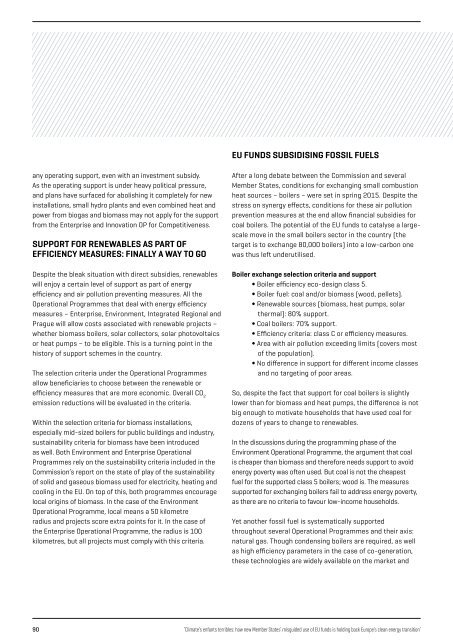ENFANTS TERRIBLES
enfants-terribles
enfants-terribles
Create successful ePaper yourself
Turn your PDF publications into a flip-book with our unique Google optimized e-Paper software.
EU FUNDS SUBSIDISING FOSSIL FUELS<br />
any operating support, even with an investment subsidy.<br />
As the operating support is under heavy political pressure,<br />
and plans have surfaced for abolishing it completely for new<br />
installations, small hydro plants and even combined heat and<br />
power from biogas and biomass may not apply for the support<br />
from the Enterprise and Innovation OP for Competitiveness.<br />
SUPPORT FOR RENEWABLES AS PART OF<br />
EFFICIENCY MEASURES: FINALLY A WAY TO GO<br />
Despite the bleak situation with direct subsidies, renewables<br />
will enjoy a certain level of support as part of energy<br />
efficiency and air pollution preventing measures. All the<br />
Operational Programmes that deal with energy efficiency<br />
measures – Enterprise, Environment, Integrated Regional and<br />
Prague will allow costs associated with renewable projects –<br />
whether biomass boilers, solar collectors, solar photovoltaics<br />
or heat pumps – to be eligible. This is a turning point in the<br />
history of support schemes in the country.<br />
The selection criteria under the Operational Programmes<br />
allow beneficiaries to choose between the renewable or<br />
efficiency measures that are more economic. Overall CO 2<br />
emission reductions will be evaluated in the criteria.<br />
Within the selection criteria for biomass installations,<br />
especially mid-sized boilers for public buildings and industry,<br />
sustainability criteria for biomass have been introduced<br />
as well. Both Environment and Enterprise Operational<br />
Programmes rely on the sustainability criteria included in the<br />
Commission’s report on the state of play of the sustainability<br />
of solid and gaseous biomass used for electricity, heating and<br />
cooling in the EU. On top of this, both programmes encourage<br />
local origins of biomass. In the case of the Environment<br />
Operational Programme, local means a 50 kilometre<br />
radius and projects score extra points for it. In the case of<br />
the Enterprise Operational Programme, the radius is 100<br />
kilometres, but all projects must comply with this criteria.<br />
After a long debate between the Commission and several<br />
Member States, conditions for exchanging small combustion<br />
heat sources – boilers – were set in spring 2015. Despite the<br />
stress on synergy effects, conditions for these air pollution<br />
prevention measures at the end allow financial subsidies for<br />
coal boilers. The potential of the EU funds to catalyse a largescale<br />
move in the small boilers sector in the country (the<br />
target is to exchange 80,000 boilers) into a low-carbon one<br />
was thus left underutilised.<br />
Boiler exchange selection criteria and support<br />
• Boiler efficiency eco-design class 5.<br />
• Boiler fuel: coal and/or biomass (wood, pellets).<br />
• Renewable sources (biomass, heat pumps, solar<br />
thermal): 80% support.<br />
• Coal boilers: 70% support.<br />
• Efficiency criteria: class C or efficiency measures.<br />
• Area with air pollution exceeding limits (covers most<br />
of the population).<br />
• No difference in support for different income classes<br />
and no targeting of poor areas.<br />
So, despite the fact that support for coal boilers is slightly<br />
lower than for biomass and heat pumps, the difference is not<br />
big enough to motivate households that have used coal for<br />
dozens of years to change to renewables.<br />
In the discussions during the programming phase of the<br />
Environment Operational Programme, the argument that coal<br />
is cheaper than biomass and therefore needs support to avoid<br />
energy poverty was often used. But coal is not the cheapest<br />
fuel for the supported class 5 boilers; wood is. The measures<br />
supported for exchanging boilers fail to address energy poverty,<br />
as there are no criteria to favour low-income households.<br />
Yet another fossil fuel is systematically supported<br />
throughout several Operational Programmes and their axis:<br />
natural gas. Though condensing boilers are required, as well<br />
as high efficiency parameters in the case of co-generation,<br />
these technologies are widely available on the market and<br />
90<br />
‘Climate’s enfants terribles: how new Member States’ misguided use of EU funds is holding back Europe’s clean energy transition’


